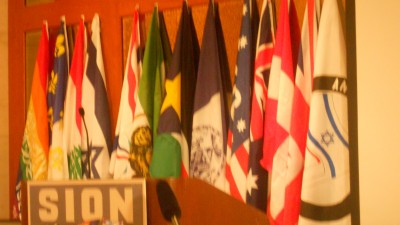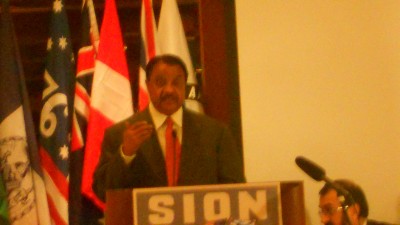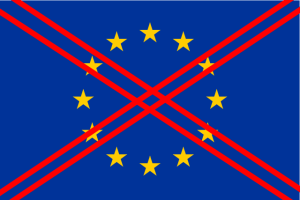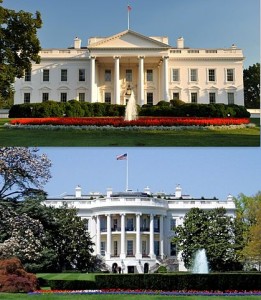
So goes the poem by iconic English writer Rudyard Kipling, a man who brilliantly limned the boundaries-be they political, cultural, or mental-which separate the East from the West. However, one commonality that both share, unfortunately, is the proliferation of a muscular, revanchist Islam intent upon dominating, if not eliminating altogether, its perceived adversaries. The penultimate panel of the Stop Islamization of Nations Congress examined countries which find themselves mired in “Stage 3″ of the illness known as Islamic jihad, as we heard from three distinguished freedom activists who hail from societies which are on the front lines of the clash of civilizations.

Credit: Atlas Shrugs
Considering that the spark for this latest iteration of global jihad was touched off in Cairo, it’s only appropriate that Ashraf Rameleh, the founder and president of the Voice of the Copts, spoke to the assembled about the 14 century-long subjugation of indigenous Egyptians by the forces of Islam. He contextualized the violence unleashed against Egypt’s remnant of believers in Christ by the Muslim Brotherhood and its Salafist allies by recounting his own personal biography, which has led him from being a persecuted minority within his homeland to a successful post-graduate education and architectural career in both Italy and the United States. The 9/11 attacks initiated by Al Qaeda upon his adopted homeland prompted him to delve more deeply into the world of anti-Islamist, pro-freedom political activism, the center of which became a campaign to raise awareness about the besieged community of Coptic Christians living in Egypt.
Although Copts were beleaguered iconoclasts among the Christian establishment of the Byzantine Empire, the true tragedy of their story began to unfold with the invasion of Egypt by Umar’s Islamic armies. After several centuries, and the imposition of the jizya upon non-Islamic subjects, their country was transmuted into the Arab-Muslim state we’ve now come to associate with political and social regression, as well as both international and domestic terrorism.
However, even after Egypt had been fully conquered by the descendants of Mohammed, the full complement of sharia law was not implemented for many years. The provisional constitution of 2011 enshrines the primacy of Islam as a source of legislation, a plank that will inevitably be carried over into the new constitution. The warnings voiced by Ashraf Rameleh are important because they foreshadow the path our own country might take if we make any concessions to the notion of a dual legal system which recognizes sharia-either in civil or criminal matters.
The call by Mohammed Morsi to ban speech Muslims consider blasphemous is merely the prelude to a wider war the resurgent ummah and its allies will wage against the freedoms we once treasured in the West. By being the proverbial canary in the coal mine, Egypt’s Coptic Christians serve as a template for what will we happen if we don’t resist the forces harnessed on behalf of Muslim rage. By continuing to yield our freedoms to a totalitarian ideology, we are ensuring that the Copts will not be the last victims of the jihadist mentality.

Someone who is intimately familiar with that way of thinking is Mordechai Kedar, an Arabic literature scholar from Bar-Ilan University. Dr. Kedar noted that his country, Israel, was under constant bombardment from its foes not merely because of its unique character as the sole Jewish state, but also because it serves as a symbolic avatar of the United States; little Satan to our Great Satan. The freedoms, including freedom of speech, which Israelis esteem are the same freedoms that Americans enjoy, but which is under withering attack by institutional forces sympathetic to Islam.
One of the more intriguing aspects of his speech touched upon the dichotomous nature of Islam’s response to criticism of its holy book and prophet, and by extension, its core religious tenets. He made the astute observation that Islam is not opposed to criticism per se, a point illustrated by the rejection-and conversely, codification-of certain hadiths that met with either approval or disapproval among the ruling ulama. No, what Islam’s adherents categorically reject is criticism and/or dissent from Islamic dogma by non-Muslims, i.e. kufr. Because Islam views itself as superior to all other faith systems, it cannot scruple any evidence that contradicts the revealed truth of the Koran which emanates from Christians or Jews, much less Hindus, Buddhists or atheists.
It is precisely this sense of superiority which makes the wave of Islamic immigration which has submerged the continent of Europe over the past half-century such an existential crisis. Dr. Kader’s identification of the demographic implosion European nations have undergone in the past half-century-and its attempt to mask this dilemma by importing bodies from the Middle East and North Africa-is not a novel concept. See Mark Steyn. However, I appreciated his honesty in pinpointing one of the main reasons for this crisis. Namely, the lack of will among Europeans to produce future generations of Europeans. The mass influx of Muslim immigrants into EU countries can be traced to a number of factors, but two of the most prominent-as Dr. Kader delineated in his speech-are the attempt by their nations of origin to displace economic-hence, political-discontent, and the slow, yet inexorable, death spiral of Europe. Personally, I don’t think Dr. Kader spent enough time examining the fundamentally undemocratic nature of Europe’s management of mass immigration, but I do applaud his refreshing willingness to “call a spade a spade.”

An equally blunt assessment of the dire nature of the threat Asia-and by inference, the West-faces came from Babu Suseelan, who hails from India, a cautionary tale on the perils of inter-communal relations, especially within those nations whose inhabitants disagree with regard to the virtue of Islamic teachings. Although most here might remember the exchange of citizens that occurred between India and Pakistan after the former’s postcolonial partition in 1949, what most aren’t aware of is the fact that over thirteen percent of the Indian population remains committed to various forms of Islam.
Although often portrayed as a tolerant, peaceful minority within the larger mosaic of a multi-confessional state, Muslims within India have had a checkered past that begins with the 7th century Arab-Muslim invasions of Punjab and Sindh and continued with a series of holocausts which-as Dr. Suseelan noted-have no equal in the history of religious persecution, and whose number of victims are conservatively placed at 80 million. Deobandism takes its name from a center of Islamic “learning” that-although touted for its deceptively pacific overtures-is the Indian analogue to the obscurantist Islamic doctrine which took down the World Trade Center, and is responsible for the wave of “martyrs” who regularly slaughter innocents throughout the Indian subcontinent and South and Central Asia.
Yet the true threat posed by Islam is not merely terrorist violence-as horrific as this manifestation of jihad might be-which is merely an expedient to an end, rather than an end in itself. The mortal threat inherent in Islam is its persistent ability to circumscribe the terms of debate and discussion in heretofore open societies. The decision by the government of Rajiv Gandhi to ban the importation of The Satanic Verses, and the fact that public readings of this work are not allowed to take place-even as its author promotes his new memoir recounting his years in hiding from Ayatollah Khomeini’s fatwa-is testament to the enduring power of Islam to silence its critics, even in purportedly free societies. We’ve already witnessed scenes on American soil that are reminiscent of courageous Bengali writer Taslima Nasreen’s flight from India; how long before the right to dissent from Islamic orthodoxy is proscribed altogether? The banning of books is the gateway to the banning of ideas.
This is precisely why the question of Islam’s place in Western society must be debated and discussed openly, especially in countries like ours, which still has yet to bear the full brunt of a comprehensive ideology which seeks to consign its critics to the same fate as that of the courageous refuseniks who rejected the groupthink imposed by leaders of the former USSR. Whether the resolution to this problem is to enact a wholesale ban on Muslim immigration-as Mr. Susaleen suggests-remains to be seen. However, what can’t be denied is that the cavalier attitude we have towards the migration of millions human beings whose values and mindset are incontestably opposed to ours has not worked, and must be challenged on every level.
In our fourth and final part, we’ll reveal how this challenge is unfolding in Europe, the birthplace of Western civilization and one of the prime battlegrounds in the global battle for freedom of thought and expression.







Good job–and not a cursory once-over, as demanded by this critical topic today, Gerard.